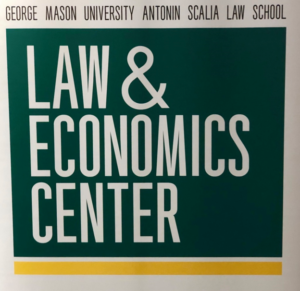by Jonathan Gledhill

On Friday, I had the great privilege to join a panel discussing the policy and economic issues of perfluorinated alkyl substance (PFAS) regulation hosted by the George Mason University Law and Economic Center (LEC). We had a lively exchange debating the current state of the science and the policy and legal ramifications of listing PFAS as hazardous substances under Federal liability statutes like CERCLA. Well over 100 Congressional staff and guests attended, an example of the high interest in this public policy issue.
Scott Faber, Senior Vice-President of Environmental Working Group (EWG) expressed his organization’s view that PFAS chemicals pose a clear hazard, are ubiquitous, and demand immediate remediation. He gave his reason to list PFAS chemicals as hazardous substances under CERCLA. Tracy Mehan, Executive Director of Government Affairs at the American Water Works Association (AWWA), gave his views that a hazardous substance designation could leave many integrated drinking water/wastewater utilities as liable parties and preclude recycling of biosolids. Steve Jawetz, principal at Beveridge & Diamond, gave the audience an overview of the on-going PFAS civil litigation as well as the liability implications of CERCLA designation.

I offered the audience my view that the most stringent Federal and state regulatory guidance and proposed standards have significant procedural and scientific flaws. For example, the EPA’s scientific analysis in the 2016 drinking water health advisories has never been peer reviewed. Some commenters have found that the most recent New Jersey proposed drinking water standard contains fundamental mathematical errors. From our experience with other emerging chemicals, if agencies rush to set standards without evaluating the best available science and holding independent peer review, agencies find they must go back and revise them and ultimately delay public health protection. I urged that we – industry, stakeholders, and agencies – can do better for PFAS by learning from the lessons of the past.


Leave A Comment